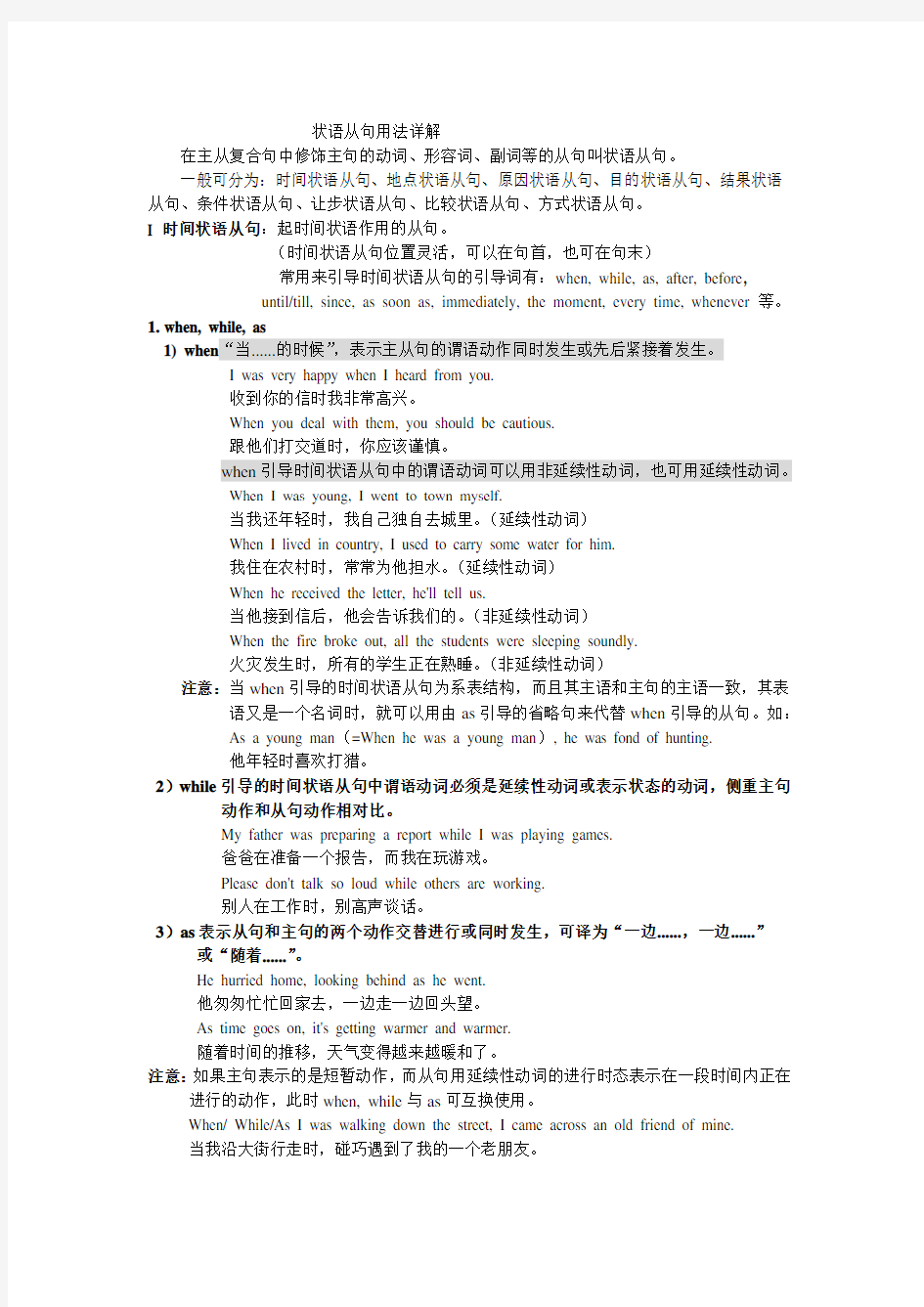最新高中英语状语从句用法详解文档培训讲学

- 1、下载文档前请自行甄别文档内容的完整性,平台不提供额外的编辑、内容补充、找答案等附加服务。
- 2、"仅部分预览"的文档,不可在线预览部分如存在完整性等问题,可反馈申请退款(可完整预览的文档不适用该条件!)。
- 3、如文档侵犯您的权益,请联系客服反馈,我们会尽快为您处理(人工客服工作时间:9:00-18:30)。
状语从句用法详解
在主从复合句中修饰主句的动词、形容词、副词等的从句叫状语从句。
一般可分为:时间状语从句、地点状语从句、原因状语从句、目的状语从句、结果状语从句、条件状语从句、让步状语从句、比较状语从句、方式状语从句。
I 时间状语从句:起时间状语作用的从句。
(时间状语从句位置灵活,可以在句首,也可在句末)
常用来引导时间状语从句的引导词有:when, while, as, after, before,
until/till, since, as soon as, immediately, the moment, every time, whenever等。
1.when, while, as
1) when“当......的时候”,表示主从句的谓语动作同时发生或先后紧接着发生。
I was very happy when I heard from you.
收到你的信时我非常高兴。
When you deal with them, you should be cautious.
跟他们打交道时,你应该谨慎。
when引导时间状语从句中的谓语动词可以用非延续性动词,也可用延续性动词。
When I was young, I went to town myself.
当我还年轻时,我自己独自去城里。(延续性动词)
When I lived in country, I used to carry some water for him.
我住在农村时,常常为他担水。(延续性动词)
When he received the letter, he'll tell us.
当他接到信后,他会告诉我们的。(非延续性动词)
When the fire broke out, all the students were sleeping soundly.
火灾发生时,所有的学生正在熟睡。(非延续性动词)
注意:当when引导的时间状语从句为系表结构,而且其主语和主句的主语一致,其表语又是一个名词时,就可以用由as引导的省略句来代替when引导的从句。如:
As a young man(=When he was a young man), he was fond of hunting.
他年轻时喜欢打猎。
2)while引导的时间状语从句中谓语动词必须是延续性动词或表示状态的动词,侧重主句动作和从句动作相对比。
My father was preparing a report while I was playing games.
爸爸在准备一个报告,而我在玩游戏。
Please don't talk so loud while others are working.
别人在工作时,别高声谈话。
3)as表示从句和主句的两个动作交替进行或同时发生,可译为“一边......,一边......”
或“随着......”。
He hurried home, looking behind as he went.
他匆匆忙忙回家去,一边走一边回头望。
As time goes on, it's getting warmer and warmer.
随着时间的推移,天气变得越来越暖和了。
注意:如果主句表示的是短暂动作,而从句用延续性动词的进行时态表示在一段时间内正在进行的动作,此时when, while与as可互换使用。
When/ While/As I was walking down the street, I came across an old friend of mine.
当我沿大街行走时,碰巧遇到了我的一个老朋友。
2. till, until和not... until
1)肯定句:主句的谓语动词必须是延续性动词,主句、从句都为肯定式,意为“某动作一直延续到某时间点才停止”。
He remained there until/ till she arrived.
他在那一直等到她来。
You may stay here until/ till the rain stops.
你可以待在这里直到雨停。
2)否定句:主句的谓语动词必须是非延续性动词,从句为肯定式,意为“某动作直到某时间才开始”。构成not...until/till,意为“直到......才”。
She didn't go to bed until I come back.
你必须留在这儿直到我回来。
Don't worry. We won't set off until you arrive.
不要担心,你到了我们再出发。
3)till不可以置于句首,而until可以。
Until you told me the news, I had no idea of it.
直到你告诉我,我才知道这个消息。
4)not...until 句型中的强调和倒装用法。
直到你告诉我,我才知道这件事。
强调句型:It was not until you told me that I had any idea of it.
倒装句型:Not until you told me did I have any idea of it.
(not until置于句首,主句要用部分倒装结构)
Not until the clock struck 12 did she realize she must go home at once.
直到钟敲了12下,她才意识到她必须马上回家了。
3. before
1)before作“没有来得及......就”“未......就”“......就......”解时,强调主句谓语动词表示的动作发生得过早或过快。
Someone called me up in the night, but they hung up before I could answer the phone.
有人半夜给我打电话,但我还未来得及接他们就把电话挂了。
They had talked only a few minutes before they found they were quite different in opinion.
他们才谈了几分钟就发现他们的意见很不一致。
2)before作“......才......”解时,强调从句谓语动词表示的动作发生得太慢或太晚。
The bus driver almost knocked me down before he saw me.
那位公交车司机差一点把我撞倒,他才看见我。
The fire lasted about four hours before the firefighters were able to control it.
大火持续了大约四个小时,消防员才把火控制住。
3)before可译为“趁”“以免”“以防”等。
I'll do it before I forgot it.
趁还没有忘,我现在就把这事做了。
We'd better finish the work in time before the boss scolds us.
我们最好按时完成工作,免得挨老板骂。
4)before可译为“(宁可......而)不愿”。
He'd die before he apologizes to them.
他宁死也不向他们道歉。
I'd give up the plan before I turn to him for help.
